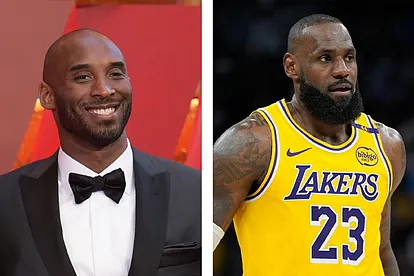
The LeBron James vs. Kobe Bryant debate has been a fixture in NBA circles for more than a decade, and this week it got new life thanks to a familiar but unexpected voice—former Los Angeles Lakers big man Kwame Brown. Known for his polarizing NBA career and outspoken personality after retirement, Brown reignited the conversation by pointing to clutch statistics as the ultimate separator between the two icons.
In a viral video clip, Brown argued that while LeBron James’ résumé may be unmatched in terms of longevity, versatility, and all-around dominance, Kobe Bryant’s ability to deliver in high-pressure moments makes him the more reliable choice when the game is on the line. “When it’s time for the last shot, who do you want with the ball in their hands?” Brown said. “The numbers don’t lie—Kobe was just different in the clutch.”
The Case for Kobe’s Clutch Facto
Kobe Bryant’s reputation as one of the most cold-blooded closers in NBA history has long been part of his legend. From game-winners against rivals like the Phoenix Suns to unforgettable playoff daggers, Bryant’s willingness to take—and often make the final shot endeared him to fans who valued “killer instinct.”
Statistically, Bryant attempted far more late-game shots than LeBron James, a reflection of his role as the Lakers’ unquestioned go-to scorer. According to NBA advanced metrics, Kobe hit more than two dozen game-winning or game-tying shots in the final seconds of regulation or overtime during his career. Critics often point to his shooting percentage in those situations being below 40%, but for fans and players like Brown, volume and mentality outweigh the efficiency argument.
“Kobe wasn’t scared of the moment,” Brown emphasized. “Even if he missed, he wanted the responsibility. That’s greatness.”
LeBron’s Numbers Tell a Different Story
LeBron James, on the other hand, has faced years of criticism for allegedly being “passive” in late-game moments, but the data paints a different picture. According to ESPN Stats & Info, LeBron actually holds a higher field-goal percentage in the final 24 seconds of close playoff games than Bryant. James has also recorded more playoff buzzer-beaters than Kobe, including iconic moments against the Orlando Magic (2009) and Indiana Pacers (2018).
Supporters of LeBron argue that his approach to crunch-time basketball—making the right basketball play rather than forcing shots—embodies his greatness. While Kobe sought to dominate individually, LeBron often created clutch opportunities for teammates like Ray Allen, Kyrie Irving, and Anthony Davis.
Brown acknowledged this but doubled down on his belief that mentality matters more than statistics. “LeBron makes the right play, but Kobe made the play,” Brown said. “There’s a difference.”
Why Brown’s Comments Matter
Kwame Brown’s words carry intrigue because of his history with the Lakers. Drafted first overall in 2001, Brown joined Los Angeles in 2005, where he shared the locker room with Bryant during a turbulent period of the franchise. Though his own career was often criticized, Brown has embraced his platform in retirement, speaking candidly about players and the league on social media.
By framing the Kobe vs. LeBron debate around clutch stats, Brown has tapped into a core argument that resonates with fans: greatness isn’t just about numbers, but about who delivers when it matters most.
The Debate That Never Ends
Ultimately, the LeBron vs. Kobe comparison reflects two contrasting styles of basketball excellence. Kobe Bryant embodied relentless scoring and fearless shot-taking, while LeBron James represents efficiency, versatility, and unselfish brilliance. Depending on what fans value—mentality or metrics—the answer to “who’s better in the clutch” will always differ.
What’s certain is that Brown’s comments have reenergized the debate, sparking fiery discussions across social media and sports talk shows. For basketball fans, that might be the biggest clutch moment of all—keeping the legacy of two all-time greats alive in the cultural conversation.

Leave a Reply